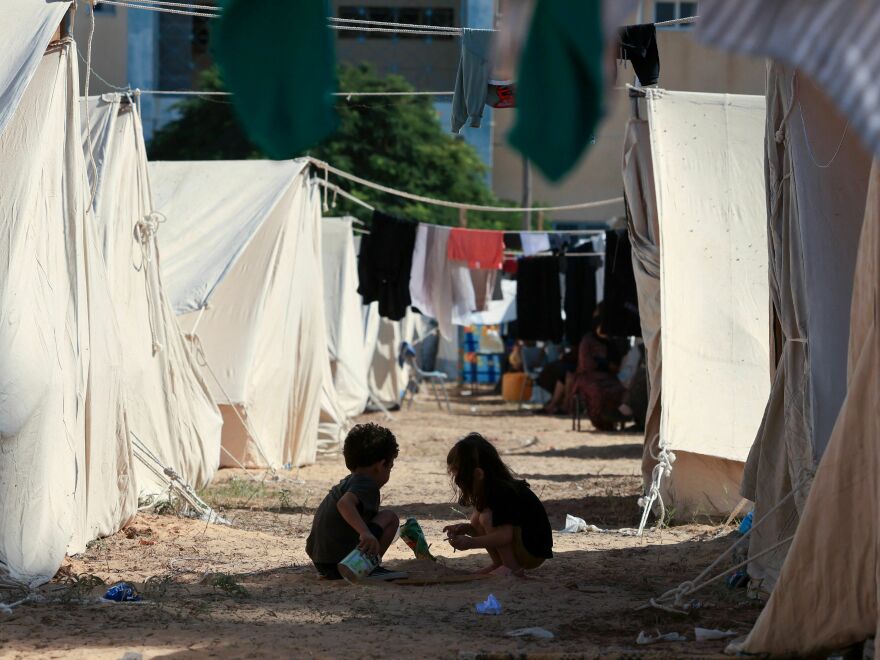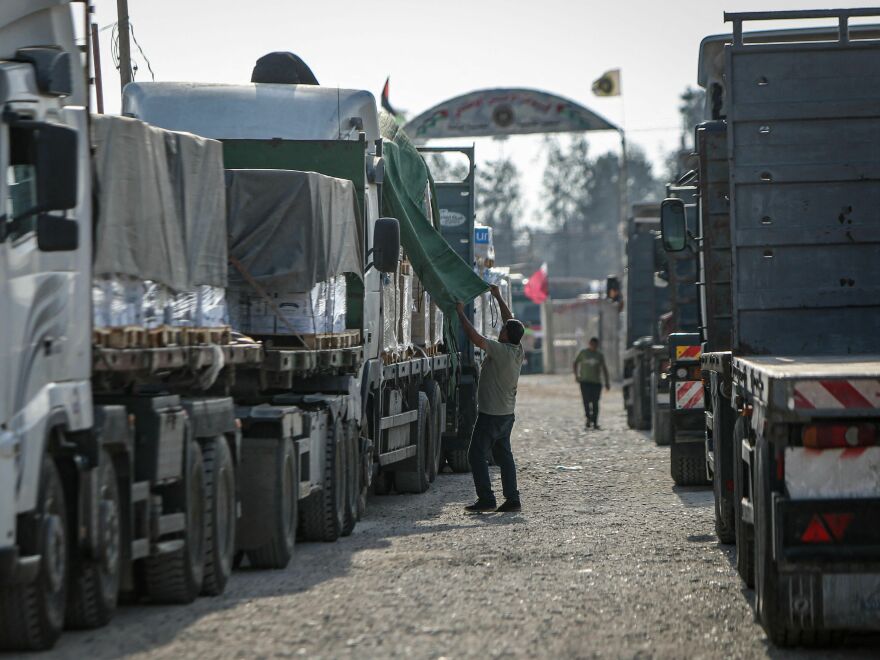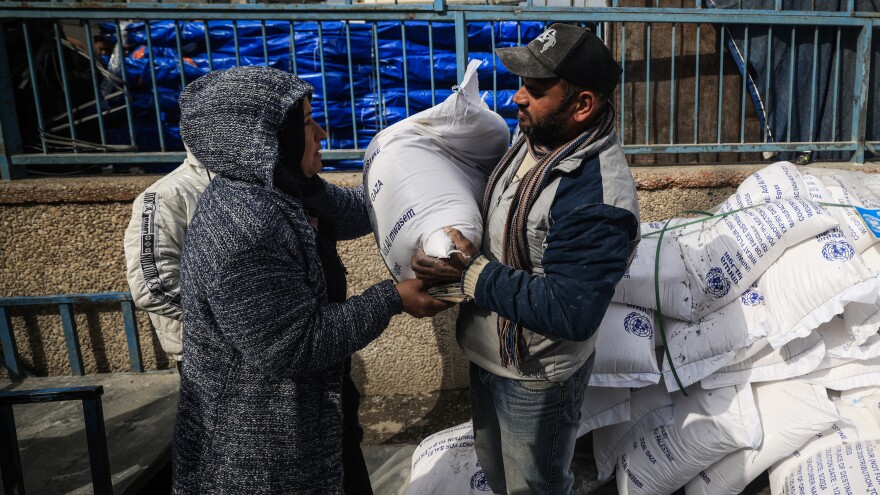Updated January 29, 2024 at 3:01 PM ET
The main U.N. agency in Gaza has been called a "lifeline for Palestinian people in Gaza" and has been instrumental in sheltering displaced people and providing other critical assistance to Palestinians during the war between Israel and Hamas.
Now, it's in turmoil after it fired several employees following allegations they were involved in the Hamas attacks in Israel on Oct. 7 that killed about 1,200 people.
UNRWA, formally known as the United Nations Relief and Works Agency for Palestine Refugees in the Near East, employs 13,000 people in Gaza alone.
Here's an overview of the organization, its history and the current allegations.
What is UNRWA and why was it started?
UNRWA was formally established in 1949 by U.N. resolution and tasked with carrying out direct relief to 700,000 Palestinians who were displaced by the Arab-Israeli war of 1948.
For over 70 years, the U.N. General Assembly has continued to renew UNRWA's mandate, instructing the agency to provide health care, housing and financial assistance to Palestinian refugees throughout Gaza, the West Bank, Jordan, Syria and Lebanon.
Before the latest conflict began, education made up the bulk of UNRWA's funding, with the agency running schools for half a million school-age children.

UNRWA's services are available to those who are registered as a Palestinian refugee, which the agency defines as a person whose "normal place of residence was Palestine during the period 1 June 1946 to 15 May 1948, and who lost both home and means of livelihood as a result of the 1948 conflict."
The descendants of male Palestinian refugees, including adopted children, are also eligible.
According to the agency's website, more than 5.9 million people are currently registered under that criteria, including roughly two-thirds of the estimated 2.3 million people living in Gaza.
The agency says it employs more than 13,000 aid workers, including refugees themselves, in the Gaza Strip alone. Those workers operate more than 150 permanent and temporary shelters and run 80 mobile health teams, including some that have been damaged or destroyed in the most recent conflict.
What are the allegations against UNRWA employees?
It is unclear exactly what the employees did, but UNRWA said it was "taking swift action" after Israel presented it with evidence that 12 people who worked for the organization took part in the Oct. 7 attacks.
Neither Israel nor the United Nations immediately provided further details about the allegations.
UNRWA said of the 12 people implicated, nine were fired, one was confirmed dead, and they are looking into the identity of two others.
In a statement to NPR, the Israeli military said it found incriminating evidence that several of the agency's employees were involved in the Hamas attack and that U.N. facilities were actually used for terrorist purposes.
UNRWA has asked the U.N.'s Office of Internal Oversight Services to conduct an investigation. It's unclear how long that will take, and it's also unclear how long the agency can continue to operate with its current funding.
Who funds UNRWA and what has been their response?
Over 90% of UNRWA's funding comes from "voluntary contributions" from U.N. member states, according to recent financial data.
In 2022, the agency says it received over $1 billion in total pledges. With a contribution of $344 million, the U.S. was the largest individual donor in 2022, followed by Germany and other European countries.
Almost immediately after the employees were fired last week, the United States said it was pausing its funding while it looked into the allegations. Canada, Australia, the United Kingdom and Italy followed suit. Last year, the U.S provided $422 million to the agency.
As of Jan. 27, UNRWA said nine countries had temporarily suspended their funding.
"While I understand their concerns – I was myself horrified by these accusations - I strongly appeal to the governments that have suspended their contributions to, at least, guarantee the continuity of UNRWA's operations," said U.N. Secretary-General António Guterres.
The Jordanian king has urged countries to continue funding to UNRWA.
What could this mean for people in Gaza?
UNRWA said that 2 million people in Gaza depend on the aid that the organization delivers. It said that if funding is cut off, UNRWA will not be able to meet the needs of Palestinians in Gaza through February.
The agency estimates that up to 1.7 million people are sheltering in or near its facilities, which include schools and aid warehouses. UNRWA has been coordinating convoys of food and medical supplies into Gaza.
"It would be immensely irresponsible to sanction an Agency and an entire community it serves because of allegations of criminal acts against some individuals, especially at a time of war, displacement and political crises in the region," UNRWA Commissioner General Philippe Lazzarini said in a statement.
Why countries help fund UNRWA
For many of these countries, the incentive for funding UNRWA is maintaining a sense of stability in the region, said Anne Irfan, a lecturer at University College London who studies the international refugee system.
"Historically, the primary concern, certainly on the part of the U.S., was that Palestinian refugees might be susceptible to communist recruitment," she told NPR in an interview last week. These days, some politicians have swapped the word "communist" for "terrorist," the official U.S. designation for Hamas fighters. But the rationale remains similar.
Irfan compared it to the Marshall Plan, the U.S. policy of providing financial aid to Western European countries following World War II.
But over time, support for the strategy has, at times, given way to political pressure.
In 2018, the Trump administration withheld millions of dollars in aid funding for UNRWA and other Palestinian aid groups. Administration spokespeople said the holdup would pressure UNRWA to undergo reform, but the then-president tweeted that the cuts were related to Palestinian leaders refusing to "talk peace."
Under the Biden administration, the U.S. has resumed funding for UNRWA and other Palestinian aid groups, but has also seen that aid criticized by congressional Republicans, creating a permanent layer of uncertainty for UNRWA's operations.
Even before the latest war broke out, UNRWA's funding was so unstable that it put the agency at risk of unraveling, according to a report from the International Crisis Group, a nonprofit think tank that advocates for resolving armed conflict.
What has UNRWA said about the war?
On Oct. 7, Hamas-led militants crossed from Gaza into southern Israel, killing about 1,200 people and taking over 240 hostages, according to counts from Israeli authorities.
Israel has responded with a total siege, heavy bombardments and a ground offensive in Gaza that have killed more than 26,000 Palestinians and displaced many more, according to Gaza's Health Ministry.
When it comes to the latest conflict, UNRWA is not solely administering aid to those that remain in the territory, but also actively trying to get more of that aid into Gaza.
Israeli defense forces have closed all but one border crossing into Gaza and are imposing strict limits on what can pass through out of concerns that Hamas, which rules Gaza, might co-opt the supplies to further its own fighting.

An average of 30 trucks a day have passed through the Rafah border crossing with Egypt since the first aid trucks entered Gaza on Oct. 21, but UNRWA says that's nowhere near what's needed to meet demand.
The agency has placed a special emphasis on the lack of fuel, which it says is needed to power generators for everything from hospitals to water treatment plants.
In a more big-picture sense, UNRWA has backed a call for an "immediate humanitarian cease-fire," a permanent cessation of violence to stop what it called the "horrific" and "unacceptable" killing of civilians.
Among the fatalities in over a month of war in Gaza are at least 99 UNRWA aid workers, the agency's commissioner said at an international conference on Thursday.
"That's the highest number of U.N. aid workers killed in such a short amount of time," Lazzarini said.
And UNRWA officials confirmed to NPR on Wednesday that at least one-third of the staff were killed south of the Wadi Gaza line. Israeli leaders had told civilians in Gaza to relocate to that southern area for safety as they stepped up attacks in northern Gaza.
What's UNRWA's relationship with Israel?
Israel affirmed UNRWA's ability to operate in Gaza with "the full co-operation of Israel authorities" in a 1967 agreement.
Its commitment to that agreement is "begrudging" but necessary, as Irfan, the University College London scholar, describes it.
"On the surface, Israel is really critical of UNRWA," she said. But behind the scenes, "they see it as preferable to the alternative. UNRWA provides the services which would otherwise come under Israel as the occupying power."
Following a deadly round of fighting in 2007, Israel implemented a strict land, air and sea blockade on Gaza, which not only limited the region's economic prospects but has severely limited the inflow of basic goods like food and medicine over the last decade and a half.
Even before the latest war broke out, the aid that UNRWA was delivering was "in some cases, really basic, essential stuff," Irfan said. "It's water rations or food provisions — stuff we would probably consider emergency relief."
But Israeli politicians, including current Prime Minister Benjamin Netanyahu, have at times called for UNRWA's dismantling, saying that the agency does the work that should be done by a government that includes elected Hamas officials.
"Israel regards UNRWA as part of the problem," said Ahron Bregman, an Arab-Israeli relations scholar with the King's College in London. "With UNRWA support to Palestinian refugees — feeding them, educating them, providing them with health facilities — Hamas is free to fight."
Bregman told NPR over email that a common grievance among Israeli politicians is that UNRWA regards the children of Palestinian refugees as refugees themselves, which has increased the number of dependents treated by the agency over time.
As a former director with the agency pointed out to NPR, that policy is consistent with how other U.N. organizations treat refugees around the world.
"UNRWA is not a political organization," Scott Anderson, the then-director for the agency's West Bank operations, said in a 2018 interview with NPR. "It's part of the social fabric that exists in Gaza."
NPR's Ruth Sherlock contributed reporting to this story.
Copyright 2024 NPR. To see more, visit https://www.npr.org.



